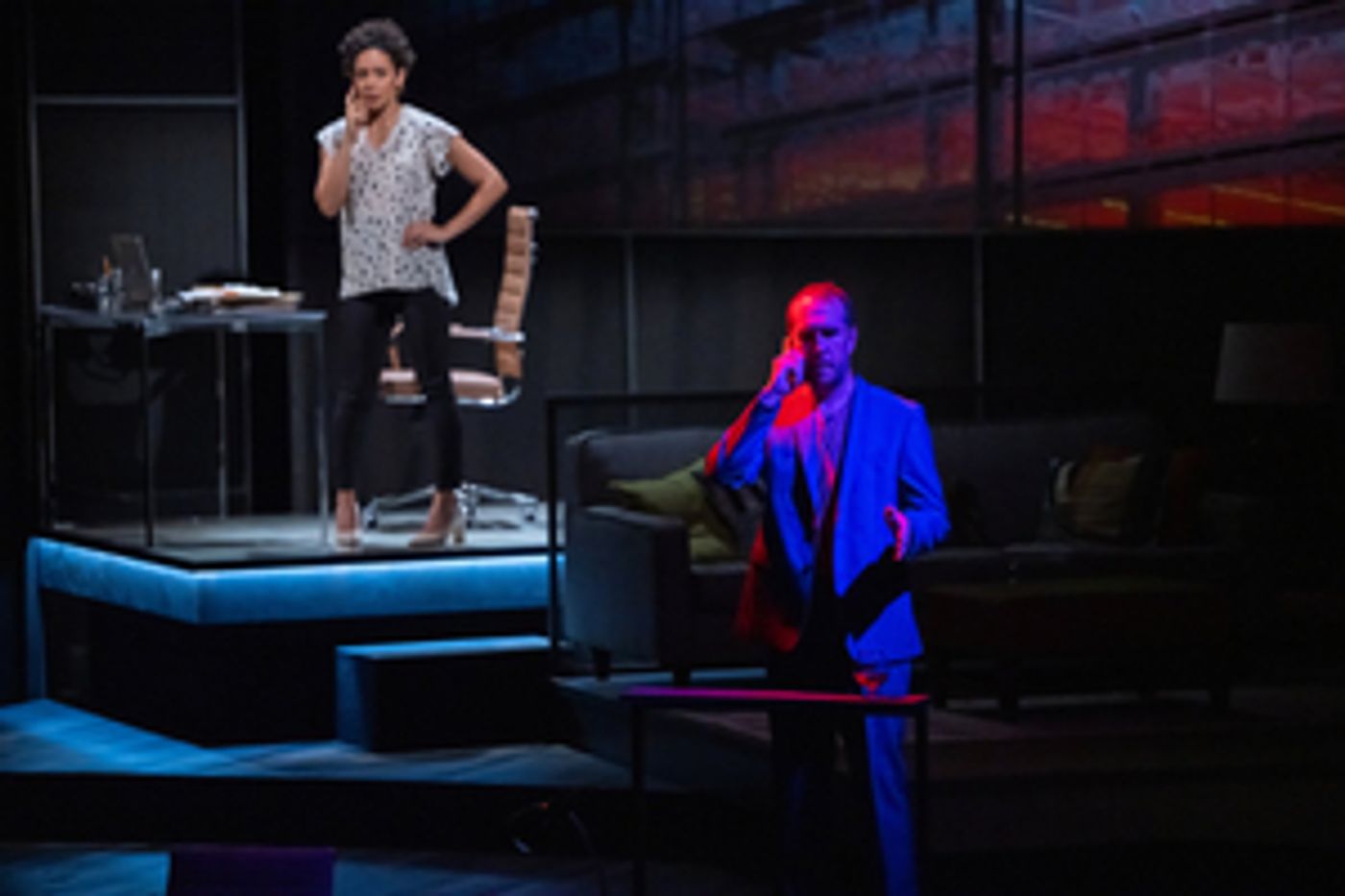Review: CATF's THE FIFTH DOMAIN a New, Warp-Speed Cyber-Thriller
THE FIFTH DOMAIN, a New, Warp-Speed Cyber-Thriller at Contemporary American Theater Festival

One of the most thrilling things for me, as an avowed theatre junkie, is to come to the Contemporary American Theatre Festival in Shepherdstown, West Virginia, and see the production teams push things to their limits, and beyond. The results can sometimes be uneven-puzzling, even-but experimentation is an important part of live theatre, and Producing Artistic Director Peggy McKowen deserves kudos for the innovative spirit she has created here.
Especially in a conventional, proscenium-style stage like the Frank Center on the Shepherd University campus, it's important to show what's possible beyond the usual character-driven drama. This year, the main stage of the Festival boasts two cutting-edge productions, each of which tests the limits of live theatre in fun, new ways (see my review of Chisa Hutchinson's "Whitelisted" elsewhere on this site).
With Victor Lesniewski's cyber-drama "The Fifth Domain," CATF steps boldly into a genre that is in its relative infancy. Focused on the world of code, on computer hacking, and on the shadowy world of international cyber-espionage, Lesniewski contemplates the darkest potential behind the infernal machines that now rule our lives, and the impact that the human element, the all too fragile, egotistical human element, can have on this technology which we have wrongly taken for granted.
The show opens with a typically mind-numbing, corporate PowerPoint presentation on internet security, with Troy (the brilliant, quirky Dylan Kammerer) holding forth, droning on in unison with the slides projected upstage. As becomes clear a few minutes in, however, Troy is truly fed up with the pedestrian nature of his own slide show, and is even more fed up with what he sees as corporate complacency. He loses his composure, and begins to rant about how slow and stupid America's CEO's really are; then a shadowy figure gets up to leave. The gesture Troy makes to this departing audience member hints at the chaos that is to come (a chaos on more than one level, it turns out).
On the surface, we see a Troy who is obviously frustrated by his superiors' refusal to level with the American public about the profound dangers that lay ahead in cyberspace; he speaks admiringly of Edward Snowden, and wishes he could reveal everything, and force the private sector to get busy. That there are always unintended consequences for these kinds of revelations doesn't register with Troy, fixated as he is, to a fault, with security.
The shady character we've just seen, Naveed (the charming, slick Aby Moongamackel), re-enters to offer Troy a plumb job on a top-secret, private sector project. Troy soon finds himself holed up in a Rosslyn office (for DC locals, the insider references are spot-on) and is paired up for this hacking job with a Chinese national, who has traveled the world and managed to fit in everywhere, even inside the Beltway.
As Mei Li, the international hacker with a dark family secret, Alexandra Palting provides a calm in the eye of the storm, a stark contrast to Troy's fanaticism. Her agenda melds with Troy's but in unexpected ways; unlike Troy, whose heart and agenda are always on his sleeve, Mei Li withholds vital clues to what makes her tick, and code.
Meanwhile Troy's ex-girlfriend, Lena (played with impeccable, professional cool by Kathryn Tkel), suspects that something about his new job doesn't exactly add up. Her responsibilities clash with Troy's, and the catastrophic results of Troy and Mei Li's work, while perhaps unintended, were clearly unavoidable. Once hackers commit to turning the cyber world upside-down, the world can collapse like a deck of cards-and then some.
As with all experimental plays, director Kareem Fahmy's production has its merits and its challenges; coordinating between the actors, Lesniewski's script and Max Wallace's deluge of upstage projections at times creates a sensory overload that renders key plot points hard to follow. There is a sometimes crystal clear, sometimes opaque interaction between actors and projections, as literally masses of code and instant messages scroll by at warp speed.
While this combination is designed to immerse audiences in the frenetic, screen-driven lives of computer hackers, there's a serious risk that the display can overwhelm the sense of the play. Having worked with a variety of screen and live media myself, what's lacking is an awareness that the larger the visual and audio platform, the slower the pace needs to be, if the audience is going to keep up with the action. There is a need to slow down here, to pare back the text on screen, and allow for specific reactions from the characters to key texts, so that audiences can keep track of what is happening and why. There are also hidden clues about what's to come - the play's big secret-which may be there, but which are extremely hard to make out.
"The Fifth Domain" has tremendous potential, and by rights should feature on one of Washington's big stages soon. But Lesniewski might want to take a page from a murder mystery or two, consider dropping a few more subtle hints along the way, and create a pace that brings audiences along with him, instead of leaving them breathless just trying to keep up.
Production Photo: Kathryn Tkel and Dylan Kammerer in the world premiere of The Fifth Domain by Victor Lesniewski. Photo by Seth Freeman.
The Fifth Domain runs as a part of the Contemporary American Theatre Festival, through July 31 at the Frank Center, Shepherd University in Shepherdstown, West Virginia.
For tickets visit https://catf.org/buy-tickets/ . You can also email the box office at boxoffice@catf.org or call them at 681-240-2283.
Reader Reviews
Videos

